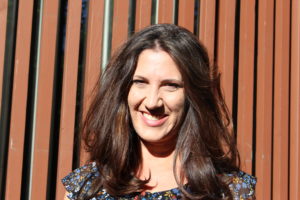I Am Starr King: An Interview with Alexis Vincent
Alexis Vincent
M.A.S.C. Student
Expected Graduation May 2015
 Why did you decide to study at Starr King?
Why did you decide to study at Starr King?
Interestingly, what brought me to the Master of Arts in Social Change program was the work that the Rev. Dr. Gabriella Lettini is doing with veterans around moral injury and the trauma that they are experiencing. This is a particular area of interest for me. It is something I had been watching develop as veterans from the most recent wars in my lifetime started to return home and were committing suicide at a very high rate. And that, to me, seemed like something that could be prevented. It seemed that a good place to focus my energy on was to try to contribute to this healing movement.
The program was something that I discovered through my research. Social change seems to be the most urgent work we are faced with when considering the breakdowns we are seeing in various systems around us and the effects that those changes have on individuals, communities, and our larger culture. This program seemed like an opportunity to work on transformative change.
You have done work around trauma both inside and outside of Starr King. Why were you called to do this work?
My family of origin was particularly traumatic. Both of my parents were combat veterans. My mother was a concentration camp survivor, enduring this from the time she was 12 to the time she was 17. And then she became a war bride for my father, who served in three different wars: World War II, Korea and Vietnam. So my household was incredibly traumatic. I experienced what it was like, up-close-and-personal, to live with people who endured extreme trauma and how that affected our lives and our family. And how we normalized that trauma.
So when I came to Starr King and began unpacking—through course work, somatic practices, and spiritual rituals—those deep traumas I had buried or normalized or somehow minimized (which is a typical trauma response), I realized that my suffering was common to the suffering of all others. And that, given my social location, by healing myself through understanding how trauma causes deep wounds and how to get out from those dark places, I could make a contribution to the world that could be particularly helpful.
What work are you doing right now around trauma?
Over my time at Starr King, my work in the world has transformed into what had been my hobby before I started here, which is working with the city of Vallejo, CA, on how to address their homelessness needs. I am doing my internship project with the Vallejo Housing Authority, trying to get information together to present a comprehensive snapshot of what is happening in the community on various levels.
What I discovered is that the latest thinking in rehabilitation for those transitioning out of homelessness highlights trauma-informed care as being a critical component to the success of those endeavors. I have realized that the hub of most of our cultural wounds could ultimately be traced, in one or another, back to trauma—whether from events or chronic situations where trauma is experienced.
What do you hope to do with your Starr King education going forward?
I have been using my education in so many ways, in every moment of every day, so it is impossible for me to imagine living a day without embodying what I learned here, in this beautiful school. So to answer your question simply, I am going to continue doing my life’s work from a place of being more informed, more multicultural, and more intersectionally aware than I was before I stepped across the threshold.
Want to share your story? Send your story to communications@sksm.edu.